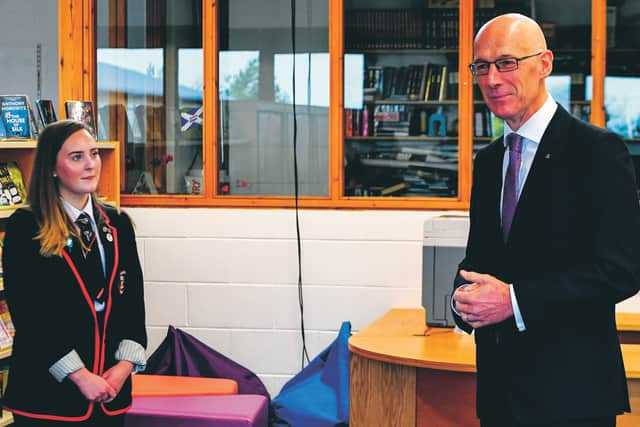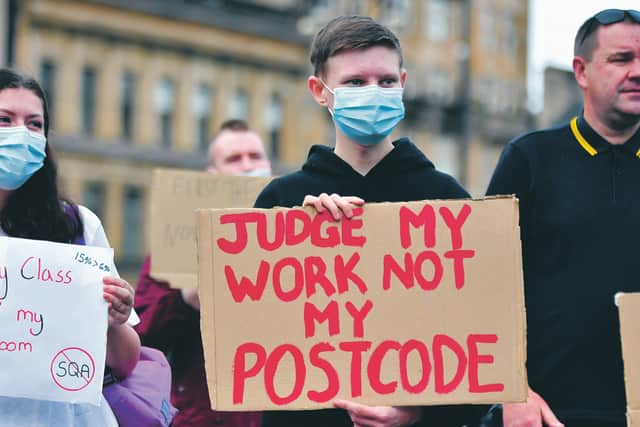Insight: The full story of Scotland’s exam results shambles


By the end of Tuesday hundreds of parents and young people were expressing their fury about grades being reduced, many from passes to fails, by the Scottish Qualification Authority’s “moderation”; the First Minister had told teachers that their judgment on what their pupils could achieve was not credible, while the head of the SQA had said teachers had been too “optimistic”; teenagers were organising mass protests and a petition calling for the whole SQA process to be overturned had attracted tens of thousands of signatures.
Newspaper front pages were devoid of the annual front page photos of happy A grade students on exam results day, instead the issue of the class divide in Scotland was back in the headlines, and by Friday there were calls for Education Secretary John Swinney,above, to resign by opposition politicians and the Twitter hashtag #resignsturgeon was trending. For a government that had been riding high in the opinion polls for its handling of the coronavirus pandemic, this week has seen a turnaround in fortunes equivalent to that of Ratner’s jewellers - only it’s children’s futures rather than a company’s fortunes on the line, and in particular those of the most deprived young people in Scotland.
Advertisement
Hide AdAdvertisement
Hide AdThe seeds of this week’s pains, were sown in March when it was agreed that this year’s examination diet was to be cancelled as a result of the virus sweeping the UK. Schools were shut, children were told to stay home, online lessons were started, and the SQA agreed that National 5 and Higher qualification grades would be based on teachers’ estimates, using prelim exam results, coursework and a holistic knowledge of individual pupils. This year trust would be placed on teacher judgment to grade pupils.


However, by April the SQA had begun to back-pedal. Talk of a need for moderation and adjusting of estimates began to surface, and when put in front of the Scottish Parliament’s education committee, there was a refusal to discuss just how that would work in practice. Warnings were made by teachers, by the Educational Institute of Scotland, by opposition MSPs, that a lack of transparency in how grades would be adjusted would lead to chaos and allegations of discrimination. So it appears to have come to pass - and all now hangs on an appeal system, free for the first time in years, which is expected to be overwhelmed at a time when schools return with the shadow of Covid-19 still looming large in the corridors.
Unsurprisingly the fury has provoked searching questions about the SQA itself, how it operates, and whether it is fit for purpose. The body - arms-length from, but accountable to, the Scottish Government, is not a stranger to controversy.
Back in 2000 an exams fiasco - where computer errors led to several thousand incorrect certificates being sent out by post - claimed the scalp of SQA chief executive Ron Tuck and there were demands from opposition MSPs, including Nicola Sturgeon, for the resignation of Labour’s Education Secretary Sam Galbraith. Instead he was re-shuffled to the environment brief, and Jack McConnell took over the reins at education, promptly appointing a new SQA board, replacing 16 of the 24 members.
In more recent years, the SQA has been under fire for its staff expenses and its selling of its advice and expertise in setting exam systems to other countries, such as Saudi Arabia, as part of a move to become wholly self-financing. It’s last chief executive, Janet Brown, was caught up in the scandal just after she announced her retirement and Unite the Union, which represents staff at the SQA, said the expenses revelations were “the latest example of a prevailing management culture at the SQA which lacks accountability and transparency.”


Brown was replaced by Fiona Robertson who was previously a senior civil servant in the Scottish Government’s education department working closely with John Swinney before her move to the independent SQA.
A lack of transparency overall, as well as a close relationship between the SQA and government is, say some of its critics, cause for concern. Holyrood’s education committee conducted one of its first enquiries this parliamentary session into how the organisation was functioning and concluded that the information it had received from teachers should give the SQA “serious cause for concern”. Some MSPs have spoken of their shock at the SQA’s unwillingness to be held to account by Parliament, with Scottish Green MSP Ross Greer saying: “Fundamentally, the SQA regard themselves as immune to scrutiny. For as long as the Scottish Government protect them, they’re basically right to feel that way.
“The Greens and other opposition parties have been making this point for years but so have SNP MSPs. The scathing reports published by the Parliament’s Education Committee were published in the name of SNP committee conveners.
Advertisement
Hide AdAdvertisement
Hide Ad“This scandal has simply highlighted that the SQA see their role as protecting the ‘integrity and credibility’ of the system. That the system doesn’t actually work for pupils or teachers isn’t their concern, or at least their primary concern. They are fundamentally uninterested in dialogue with teachers in particular because they do not trust them, which goes to the heart of what has just happened. A moderation system which involved teacher dialogue could have avoided almost all of these problems.”
Lecturer and education journalist, James McEnaney, a long-time critic of the lack of transparency around Scottish Government education decisions, agrees. He says while there are “lots of good people at the SQA, as an organisation it is often seen as being detached, arrogant and unaccountable.”
“The organisation’s conduct throughout this crisis has reinforced those criticisms.” he says. “This is also an organisation guilty of failure after failure during the recent introduction of new qualifications. Its track record is not good. Now, after everything young people have been through, they have made the decision to disadvantage poor kids in order to protect the status quo of their system - which systematically disadvantages poor kids every year.
“It’s time for a no holds barred review of the SQA because we need to know if the problem is that the wrong people are in positions of power - par for the course in Scottish education - or if it’s just that the organisation isn’t fit for purpose. Or maybe both.”
One teacher and an SQA exam marker, said that this years’ events had him doubting how the organisation really felt about teachers’ professionalism. “The SQA appears to trust us enough to mark exams but when it comes to us submitting estimates and giving our rationale, that has been discounted and that’s hard to swallow. I’ve also not got a lot of faith in the appeals system this year. Normally there are few appeals, this year I would have thought they’d get thousands, yet we’ve been told already we won’t be needed which leads me to think they’re not going to take individual pupils’ work and circumstances into account. It’s the system instead of pupils. They’re sticking to their algorithms, which would be fine if they were producing widgets, but this is kids futures.”
Former first minister Henry McLeish has history with the SQA. He was in government when the 2000 debacle hit, and took over the reins when Donald Dewar unexpectedly passed away. “The current situation has highlighted what appears to be continuing problems with the SQA,” he says. “I’m not convinced that the SQA position is strong on this. They asked for teachers judgments, and these are professional people there to do a job, and yet they have overturned their professional opinions. What is in the ken of the SQA to decide that teachers are wrong and they are right?
“There was then, and seems to still be an arrogance which is a fundamental part of the SQA but I doubt they are best placed to make judgments like this about individual children.”
He adds: “Despite the interest in all political parties to improve things and close the attainment gap, there is still a long way to go.”
Advertisement
Hide AdAdvertisement
Hide AdWhere resources are most needed of course, as all politicians will agree, is in the most deprived communities of Scotland, where schools have a hard job attempting to get kids through exams while knowing that poverty, and the associated social problems that can bring, does not lead to an even educational playing field. This year, the schools which generally perform badly as a result of their postcode, had seen a 20-point increase in passes for their pupils - until the SQA moderation changed that, to bring the results more in line with schools’ previous years’ performances.
One headteacher, who asked not to be named, said: “The most damning and dispiriting aspect is the treatment of pupils and schools from the most deprived areas. We have been working for years to improve the prospects for our most disadvantaged learners, families and communities. To now see the SQA decide to reduce the teacher assessments more in those communities, ‘for reasons of credibility’ is a slap in the face to everything we have been doing to try and close the so-called ‘equity gaps.’”
A frontline teacher in East Ayrshire said the process of “ranking” that the SQA had demanded of teachers was also flawed. “I feel awful. We had to rank the kids and if I had swapped them around, two different kids would have been failed, and two different kids passed, yet they were all estimated to pass. They’ve left school now and I’d hate for them to think I thought they would fail when I most definitely did not” she says. “In one particular subject in my school, 45 per cent of the National 5s pupils normally get As. This year it was 5 per cent. The whole thing has been handled very poorly, and the kids are bearing the brunt of it.
“We had to provide a rationale for our estimates, we have the evidence, and when you factor in the idea that kids would improve on their prelims, because they do, especially as you practice exam techniques, then to have that all overlooked... we’re all just scunnered. And the idea we would over-estimate is wrong. If we don’t think a pupil would pass, we wouldn’t put them forward for the exam, so the fact some kids are getting below Ds is unbelievable. We know the kids, yet our judgment has been entirely overlooked.”
Scottish Labour’s education spokesperson, Iain Gray points to Ross High in Tranent, in his constituency - a school which had been improving since the appointment of a new headteacher, but “it just got smacked back down again because of results two years ago,” he says. “There has been a failure to listen to all the warnings by the SQA and this is the result. It’s a shambles.”
There are critics of the SQA in the private school sector too. Rod Grant, head at Cliftonhall School, just outside Edinburgh, is furious about the “total fiasco”. “It’s very hard seeing teachers and pupils so emotional and upset by all this. It’s a mess. We had one boy estimated to get a B in a subject - the SQA gave him an A, how is that even possible? One girl estimated to get a B, gets a no award - how is that possible? It is crazy, and it’s scandalous.
“The SQA needs a healthy dose of common sense. Yes, accepting teacher estimates would have seen a rise in kids from deprived areas passing, but what exactly is wrong with that? Perhaps it would show that continuous assessment is the future, and it’s time to get rid of exams. ”
His views have been echoed by thousands of parents and pupils across Scotland - many ending up on placards at protests outside the SQA offices on Thursday. “Stop the postcode lottery”, was a particular refrain on cardboard it was hard to miss.
Advertisement
Hide AdAdvertisement
Hide AdOf course not all kids affected by downgrading were failed, but the impact of moving from just one grade to another could have long-term repercussions. At her home in Glasgow, 17-year-old Hyndland pupil Charlotte Jack was expecting a run of A grades - instead she got Bs. “It’s ridiculous because in my prelims I was one per cent shy of As so that’s what I was expecting. I was so shocked, really upset... really angry. And then I’ve got friends at other schools getting As but telling me they failed prelims.”
Also searching for some certainty for her son is Prestwick parent Lesley McPherson. “He left school in March, having just sat a maths prelim, his head held high, telling me he believed he’d done it - done enough to get on his bio-medical science course at Strathclyde University. Then the results came... the disappointment in his face was unbearable.
“He feels really let down.The process seems to be based on postcodes, and there’s no transparency at all.”
Ms McPherson perhaps speaks for the nation. For this latest SQA scandal has some way to run. The organisation did not respond to a serious of questions from Scotland on Sunday, but on Wednesday Fiona Robertson will be back before MSPs on the education committee who will once again be demanding transparency of Scotland’s exam body.
Comments
Want to join the conversation? Please or to comment on this article.